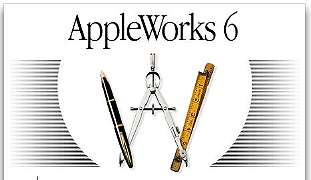
|
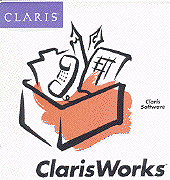
|
eXtensions
|
OSX Writing Applications: Regulars and New (Mellel) |
Top of the list, particularly in terms of bulk and price, is Microsoft Office with Word. Some users think that they must use this to ensure that files are 100% compatible for PC-using colleagues. I tried it and dumped the demo version as soon as I could. It does not handle Thai perfectly (see below) and some suggest it may cause problems with OSX operations. There are better choices in my view.
At the other end of the scale -- certainly in terms of price -- is TextEdit: part of the OSX installation. It handles text, in English, Thai or any other OSX-supported language you can throw at it; it handles graphics with click and drag ease; and can handle txt files, rich text format (rtf) and documents (doc). You can also print, with OSX, to PDF files. It does not create tables.

|

|
Another free installation with Apple's consumer machines is Apple Works. This was Claris Works which Apple acquired. The word processor will handle several formats, including documents. The suite includes a weak drawing program, presentation software (Keynote and PowerPoint are better) and a spreadsheet program that does not show pages separately: pages are on one sheet, which makes working in three dimensions difficult. It is a fall-back suite for me and is overdue an update. It does, however, include a database application.
Note: in an e-mail I was told that there is indeed a method to view pages separately, by using the Window > Page View (Shift+Command+P). While this does the task, this is neither intuitive nor obvious. Appleworks is due for an update.

Open Office, version 1.1.2 (Note: now updated to 1.1.4), is a good replacement if you are happy installing the Unix X11 window and are willing to work (rarely) with Unix commands. The word processor and the spreadsheet are powerful programs. The whole suite is considerably faster than earlier releases, particularly startup, and is a good replacement for commercial software.
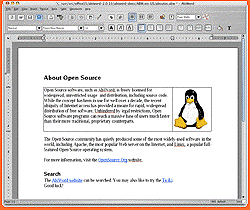 One development of Open Source software is OpenOSX Office, also updated in December: now version 1.5.1.
One development of Open Source software is OpenOSX Office, also updated in December: now version 1.5.1.
It takes a different approach to Open Office whose applications were based on the older Star Office. Open OSX Office uses Unix/Linux applications ported to OSX: AbiWord, SodiPodi (Vector graphics), Gnumeric (spreadsheet) and Diagram (flowchart).
I used an early version of OpenOSX Office and was quite happy with its operations. The suite includes something like 60 applications (Python, eel, fondu) but does not now include LaTex (see below) which is beloved of thesis writers in the USA: very tunable.
Prices for the download package (362MB) start at $30 which is low by today's commercial standards.
One of the Office suites I run regularly is ThinkFree Office (currently v. 2.2): an application written in Java. It was a little slow on my G3 iMac, but on the eMac is considerably faster. There is more than a passing similarity to the Microsoft suite. Anyone switching to this would hardly notice the difference, except in the wallet.
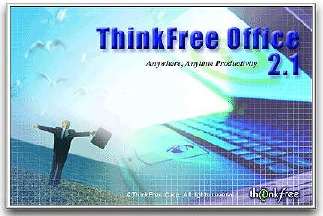
|
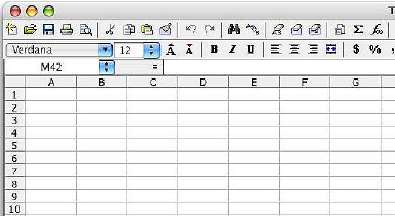
|
With the Microsoft product at $499 and this at $49.95, there is a certain economy shown here. The company was recently taken over by Haansoft, a South Korean company (who have their own version of Linux) and is based in Cupertino, CA. A feature is online space for storage and access of files.
Mellel, the new kid, is a word processor written by a Tel Aviv company, Redlex. There had been much press coverage of the lack of Hebrew support by Microsoft for Word in OSX: necessity is the mother of invention. Unlike the other applications here, the interface does not look like a Word clone. It has a cleaner appearance: like TextEdit with a metallic interface. It works with several languages out of the box, including Thai. Major tuning functions are accessed through a side "inspector" called a Palette. it is here that its power is apparent.
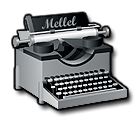
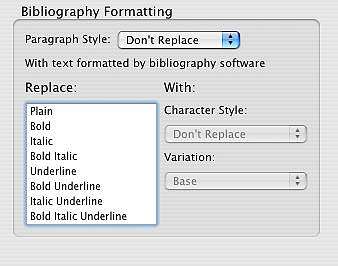
|
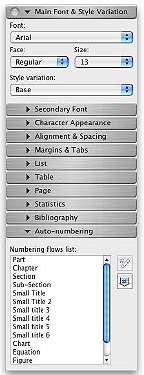
|
The Palette has several tags that allow the fine-tuning of page attributes. In the preferences, however, there is more tuning possible with particular regard to the document defaults. This feature reminded me of the setup procedure possible in LaTex. Additionally, Mellel has sections for creation of a bibliography and, not commonly found, footnotes. One local user has remained with Microsoft solely because of this. Graphics are click and drag; and tables are easy to create.
Mellel can be downloaded (5.9MB) for a test, but pages printed will have a watermark included. The purchase price is $39 ($29 with a student ID). Redler also have pages where fonts can be downloaded in several languages, including Arabic, Chinese, Japanese and Thai. This is one where my credit card comes into play.

For further information, e-mail to Graham K. Rogers.
Back to
eXtensions
To
eXtensions: Book Reviews
To
eXtensions: Year One
To
eXtensions: Year Two
Back to homepage